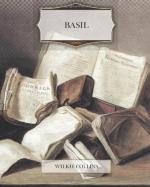At length the clergyman arrived, and we went into the church—the church, with its desolate array of empty pews, and its chill, heavy, week-day atmosphere. As we ranged ourselves round the altar, a confusion overspread all my faculties. My sense of the place I was in, and even of the ceremony in which I took part, grew more and more vague and doubtful every minute. My attention wandered throughout the whole service. I stammered and made mistakes in uttering the responses. Once or twice I detected myself in feeling impatient at the slow progress of the ceremony—it seemed to be doubly, trebly longer than its usual length. Mixed up with this impression was another, wild and monstrous as if it had been produced by a dream—an impression that my father had discovered my secret, and was watching me from some hidden place in the church; watching through the service, to denounce and abandon me publicly at the end. This morbid fancy grew and grew on me until the termination of the ceremony, until we had left the church and returned to the vestry once more.
The fees were paid; we wrote our names in the books and on the certificate; the clergyman quietly wished me happiness; the clerk solemnly imitated him; the pew-opener smiled and curtseyed; Mr. Sherwin made congratulatory speeches, kissed his daughter, shook hands with me, frowned a private rebuke at his wife for shedding tears, and, finally, led the way with Margaret out of the vestry. The rain was still falling, as they got into the carriage. The fog was still thickening, as I stood alone under the portico of the church, and tried to realise to myself that I was married.
Married! The son of the proudest man in England, the inheritor of a name written on the roll of Battle Abbey, wedded to a linen-draper’s daughter! And what a marriage! What a condition weighed on it! What a probation was now to follow it! Why had I consented so easily to Mr. Sherwin’s proposals? Would he not have given way, if I had only been resolute enough to insist on my own conditions?
How useless to inquire! I had made the engagement and must abide by it—abide by it cheerfully until the year was over, and she was mine for ever. This must be my all-sufficing thought for the future. No more reflections on consequences, no more forebodings about the effect of the disclosure of my secret on my family—the leap into a new life had been taken, and, lead where it might, it was a leap that could never be retraced!
Mr. Sherwin had insisted, with the immovable obstinacy which characterises all feeble-minded people in the management of their important affairs, that the first clause in our agreement (the leaving my wife at the church-door) should be performed to the letter. As a due compensation for this, I was to dine at North Villa that day. How should I employ the interval that was to elapse before the dinner-hour?




